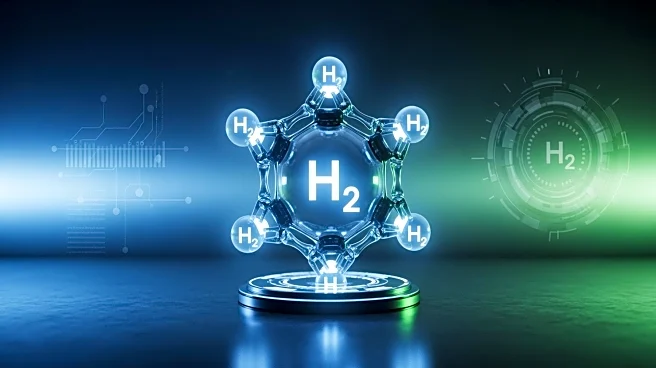What's Happening?
Hyundai Rotem has unveiled its advancements in hydrogen fuel cell technology for military vehicles at the Seoul International Aerospace & Defense Exhibition (ADEX) 2025. The company showcased two models,
the H2 WAVe and the Black versatile electric land (VEIL) platform, both powered by hydrogen fuel cells. The H2 WAVe, based on the chassis of the K808 wheeled armoured fighting vehicle, integrates a hydrogen fuel cell system with a thermal management system and a motor/multistage gear reducer. This vehicle features a solid-state hydrogen generation system and a compressed hydrogen storage system, providing electrical power primarily for propulsion. The VEIL platform is a modular unmanned ground vehicle designed for versatile military applications.
Why It's Important?
The development of hydrogen-powered military vehicles represents a significant shift towards sustainable energy solutions in defense technology. By reducing reliance on traditional fossil fuels, these vehicles can lower emissions and enhance energy efficiency in military operations. This innovation aligns with global efforts to address climate change and reduce carbon footprints. The integration of hydrogen fuel cells in military vehicles could set a precedent for broader adoption of clean energy technologies in defense sectors worldwide, potentially influencing policy and procurement decisions in the U.S. and other countries.
What's Next?
Hyundai Rotem's advancements may prompt further research and development in hydrogen fuel cell technology for military applications. Defense agencies and contractors in the U.S. might explore similar technologies to enhance sustainability in military operations. The success of these vehicles at ADEX 2025 could lead to increased interest and investment in hydrogen-powered solutions, potentially influencing future military vehicle designs and energy policies.
Beyond the Headlines
The introduction of hydrogen-powered military vehicles raises questions about the long-term implications for defense strategies and energy security. As countries invest in clean energy technologies, the geopolitical landscape may shift, with energy independence becoming a strategic priority. Ethical considerations regarding the environmental impact of military operations could drive further innovation in sustainable defense technologies.









